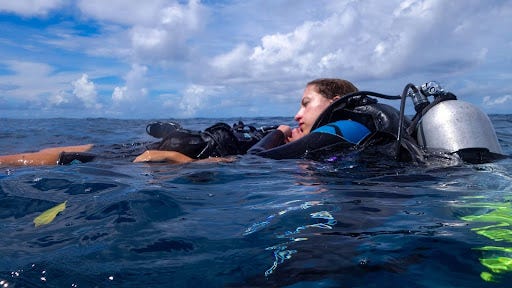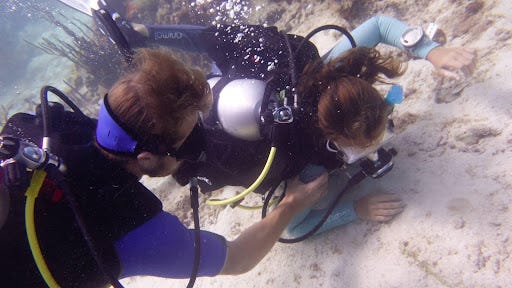5 Things You Will Love About Your Rescue Diver Course

Hand-on-heart, the Rescue Diver course is my favourite course to teach. As an instructor, teaching a good Rescue course always keeps me on my toes!
There’s a lot more than skill practice involved here. The Rescue course is all about engaging my students and getting them to think about what they’re doing and how their actions and those of others can influence outcomes.
Along the way, we have to deal with different sea conditions and adapt to people’s abilities to make sure everybody gets the most out of their rescue. It’s also about making things fun and interesting because, while we are covering some very serious stuff, it is also essential to keep stress low to allow students to learn.
If you are thinking of becoming a Rescue Diver, read on. This article will look at what makes the Rescue Diver course one of the most important courses for any diver to take.
Rescue Diver Course Overview*
Minimum age: 12 years or older
Prerequisite qualifications: Adventure Diver/Junior Adventure Diver with completed Underwater Navigation Dive; EFR Primary and Secondary Care (or equivalent training) within 24 months
Course Length: Usually around 4-5 days
*These are based on the PADI Rescue Diver course, but many training agencies (SSI, NAUI, SDI, among others) offer a Rescue Diver certification. The important thing about getting the most out of your Rescue course is choosing a great instructor!
1. Learning Hands-on Skills That Can Help You & Your Buddy
A large part of the Rescue Diver course is about doing things. I know it sounds like a “Yeah, of course” kind of statement, but rescue is not just about completing a skill twice. It’s about learning the necessary steps to handle real-life diving emergencies and understanding what you’re doing and why.
Once you have learned the steps for a rescue exercise, you will get to repeat what you have learned in fun and varied ways throughout the course until they are committed to muscle memory. These skills and reactions can keep you safe and help a diver in distress.

2. Challenging Yourself as a Scuba Diver - in a good way
The Rescue Diver course is challenging - I’m not going to pretend it’s not. You will spend your evenings falling asleep by 8 pm, and you might even collect a minor bruise or two as you learn. But the sense of achievement as you master each rescue exercise is incredible.
Found an unconscious diver, towed them to safety, and carried them up the beach? Aced it! Even if, at the start, you didn’t think you would be able to do that. Your instructor, and your buddy, will help you work on the best techniques for accomplishing rescues in different situations. Every day on the Rescue Diver course will make you feel like you’ve truly accomplished something.
3. Building Confidence In and Out of the Water
Learning how to look after yourself and other divers adds a whole new dimension to your dive skills and your awareness as a diver. Plunging in and out of the water numerous times, swimming, diving, calming, and towing your “hapless” buddy will build your confidence and your ability to handle potential emergencies.
You will also learn to solve potential problems before they occur and accomplish rescues without ever getting in the water. Still, you can look forward to getting plenty of in-water time.
By the end of the course, taking that giant stride off the boat will become as easy as going down the stairs in your own house!
4. Bonding with Your Rescue Buddy
Going through the Rescue course together creates a bond between dive buddies. You will be working together as a team, building trust, and having a lot of fun along the way. As you complete all your checks and rescue exercises time and again, your buddy’s diving equipment will become as familiar to you as your own.
On your Rescue course, you will get the opportunity to act as both the rescuer and the victim. This is a valuable experience because you’ll get to feel what it’s like being rescued, which will give you a better insight into what is important. And once you and your buddy have successfully saved each other so many times, cold beers will undoubtedly be in order!
5. Having fun and Gaining New Dive Perspectives
There will be many opportunities for having real fun on the Rescue Diver course. Sometimes my students have me in tears, laughing so much. Because even though you are training to handle serious situations, the process of getting there should have some light-hearted relief while still being instructive.
Completing a rescue can be both mentally and physically challenging at times. Taking your turn as the victim will allow you to relax a little. “Unconscious” on the ocean floor with a close-up view of the sand & seagrass, you may even observe tiny creatures and marine life behaviour you have never seen before!

Completing your Rescue Diver course
Hopefully, you won’t ever have to use most of your Rescue Diver skills in earnest. But the amount of awareness and confidence you will gain as part of your course will make you a better diver and a better buddy all around.
Although teaching techniques occasionally need a little more adjustment these days due to COVID-19 precautions, Rescue Diver is still one of the most rewarding courses for me to teach. There is nothing better than completing a successful final rescue scenario followed by cold drinks for everyone and a proud recounting of favourite moments and achievements at the end of the course!




